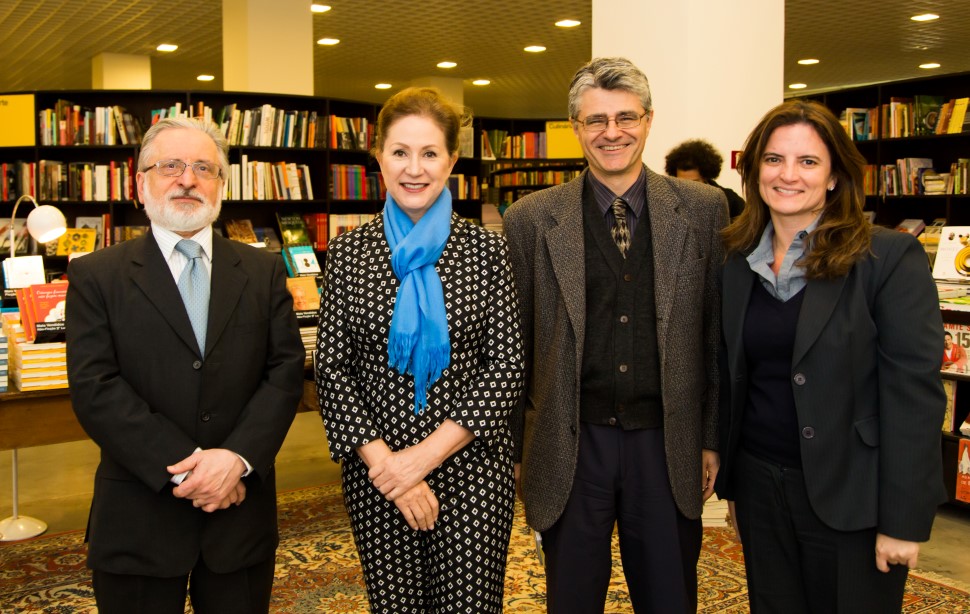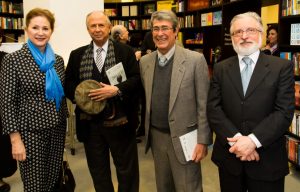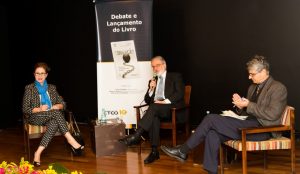Challenges and advances in the fight against corruption are discussed at ETCO book launch

Former STF Minister Ellen Gracie, journalist Oscar Pilagallo and ETCO Executive President, Roberto Abdenur, highlighted the importance of the theme in the launch of "Corruption - Obstacle to the Development of Brazil"
The launch of the book “Corruption - Obstacle to the Development of Brazil”, on August 14 in São Paulo, brought together in a round table the former Federal Supreme Court minister Ellen Gracie Northfleet, the journalist and author of the book, Oscar Pilagallo , and ETCO Executive President Roberto Abdenur. At the meeting, they stressed that the impact of corruption affects not only the economy, but the entire Brazilian society.
“Today, corruption is more easily located, Brazilians are more aware of its existence and there are more instruments to fight it,” said Ellen Gracie.
Among the instruments to combat this evil is the Anti-Corruption Law, which allows companies - and not just their representatives, individuals - to punish acts against public administration. The text guarantees the compensation of the damage caused to public coffers by acts of improbity. Proposed by the Executive Branch, and with federal deputy Carlos Zarattini (PT-SP) as rapporteur, the law was signed by President Dilma Rousseff on August 1, with three vetoes. Because of these vetoes, it goes back to Congress.
"Our law is broader than in many other countries," said Abdenur. The issue is to streamline the processes in court. In the United States, according to Abdenur, a case of corruption is tried in a maximum of one year, whereas in Brazil, it takes up to a decade.
The Mensalão trial also represents an advance in the fight against corruption, the debaters agreed. Ellen Gracie noted that it was the first case heard only by the STF. To an attentive audience, he explained why he believes there will be no retrial. But he stressed that the defendants' right of defense must be respected and preserved. "The Judiciary is not a machine to condemn, it is a machine to judge."
Both Ellen Gracie and Abdenur and Pilagallo mentioned the popular demonstrations started in June in Brazil, which presented the fight against corruption as one of their flags. The minister recalled that, according to the surveys, 82% of Brazilians supported the protests. "The main banner was urban mobility, but also health, education and the demand for an effective fight against corruption." For her, the desire to keep the movement away from political parties also deserves to be highlighted.
For Pilagallo, the increase in the education level of Brazilians has led to a greater perception of corruption and indignation against this misconduct. "Young people have access to new means of information and form a more acute critical conscience," he said.
But Pilagallo, who delved into the subject to write the book compiling the debates at the seminar held a year ago by ETCO in partnership with the newspaper Valor Econômico, contextualized the perception of greater corruption. “They say that corruption has increased a lot. It may even have increased, but we have no concrete basis for making this statement ”, he observed. "Brazil is not among the most corrupt countries in the world, according to data from the NGO Transparency International."
The Transparency International Corruption Perception Index, published since 1995, showed that in 2012, when the Mensalão trial began, Brazil ranked 69th out of 176 countries analyzed. With 43 points, slightly below the international average of 43,3 points, the country shared with South Africa the leadership among the BRICS, and ranked 3rd in South America. Among the BRICS, China ranked 80th place, India in 94th and Russia, in the lantern, in 133rd. In South America, the two best ranked countries were Chile and Uruguay, both in 20th place. Brazil was well ahead of countries like Peru (83rd), Colombia (94th), Argentina (102nd), Bolivia (105th), Ecuador (118th), Paraguay (150th) and Venezuela (165th).
Pilagallo recalls that much has been done in Brazil since the mid-1990s to combat corruption, but much more remains to be done. Greater transparency and accountability of governments and companies, intolerance of situations of transgression and elevation of democratic rates - all of these are fundamental in the fight against corruption.





